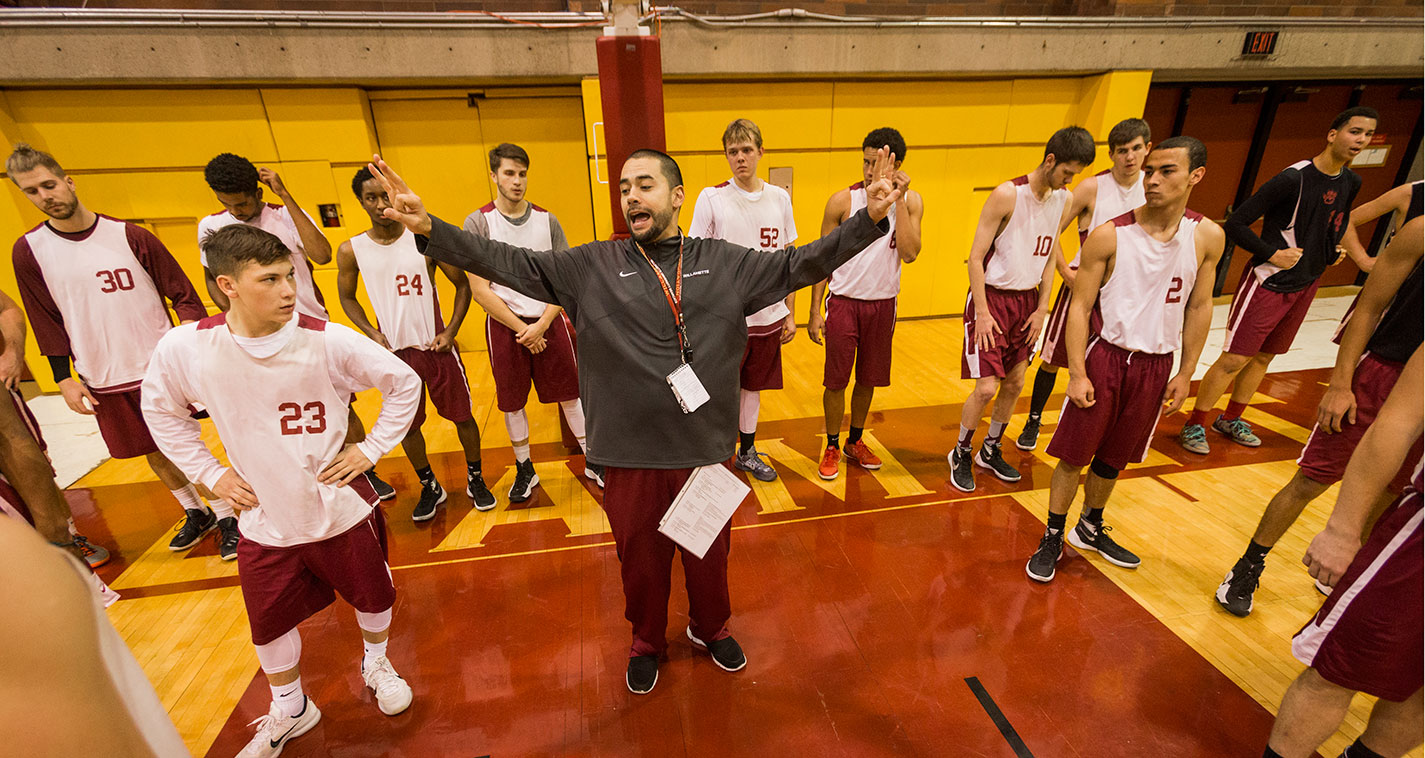They don’t see a replay of a game or a recent practice. What’s on the screen is much more important.
The players are watching a documentary about date rape.
For Head Basketball Coach Kip Ioane ’01, MAT ’02, sharing the clip with his players is difficult but necessary. As a husband and father, he wants to do everything in his power to stop gender violence.
“I feel this is as much a part of my job as basketball,” says Ioane about his four-year character-development program. “We’re going past baskets. We’re going into real life.”
Ioane’s basketball program sets out to develop men of character, create a family and build a legacy — in that order. He recruits players with that promise, which is why no one protested when the coach added the educational component in 2013. Monthly readings, movies and quizzes on sexual violence and similar topics became part of the routine.
The players list things they can do to prevent gender violence — such as attend rallies and support the work of campus-based women’s shelters. They read chapters from “Macho Paradox” by Jackson Katz, which explains why violence against women is a men’s issue. They role-play how to intervene in potentially dangerous situations.
Bridger Harlington ’16, a senior wing, was at first taken aback by Ioane’s fervor for the material. Now, he says, “Athletes are role models, whether we like it or not. Stopping sexual violence is on all of us. We all share the responsibility.”
When he teaches his curriculum to freshmen, Ioane bombards them with statistics: Nearly all rape suspects are male, most female victims know their assailants, and most perpetrators are repeat offenders.
Such facts — provided by educational materials and local experts — succeed in grabbing the players’ attention.
“They don’t want these statistics associated with their name, their family’s name or our program,” Ioane says. “Once I shock them, we can move forward.”
Having collaborated with Ioane for the past year, Director of Community Education Carli Rohner says his drive is her “professional dream.”
She’s particularly struck by how he tests assignments himself before issuing them to his players. He flew back to his old high school in Montana to give a presentation on the subject and get a better sense of what resonated with youths. Now, as their capstone project, his players make similar presentations either at their alma maters or at Salem high schools.
“He walks the walk,” Rohner says. “Kip motivates his players to become better people.”
If they utter profane or homophobic slurs, Ioane sentences his men to pushups and laps across Willamette’s 12th Street sky bridge. And if they don’t complete their class assignments, they’re not allowed on the court.
These lessons hit home. Harlington now watches his language and talks to his peers about the dangers of making stupid mistakes while drinking. He also pays more attention to how the media portrays acts of violence against women.
“You never hear, ‘A man raped a woman,’” he says. “You hear, ‘A woman was raped.’”
Until she met Ioane, Rohner hadn’t heard of any coach, anywhere, who had developed a long-lasting, multiyear character-development program. At Willamette, Ioane’s efforts have created a ripple effect. Other coaches now give similar reading assignments, and some encourage their players to attend Ioane’s classes.
Rohner says the program works because the players can see themselves in their coach. He’s young. He played basketball while a student at Willamette. And he was a finalist for the Jostens Trophy — awarded to the NCAA Division III men’s basketball player of the year.
If these are the reasons his men listen, Ioane isn’t complaining. Having had strong male role models throughout his own life, he now aspires to provide a positive influence for his team.
As he says, “We want to create a place where truth exists between [us], even though we may not want to hear some of it.”
* This story first appeared in the Spring 2016 issue of Willamette Magazine.


